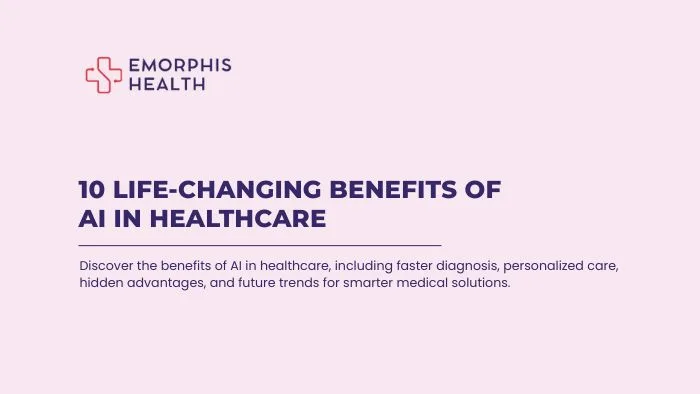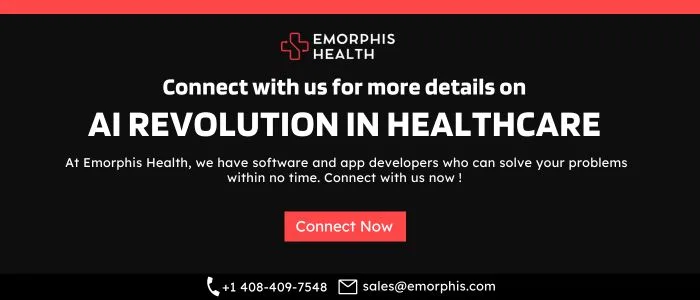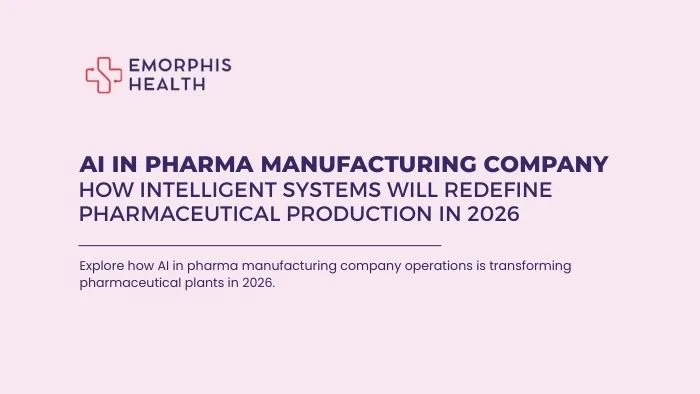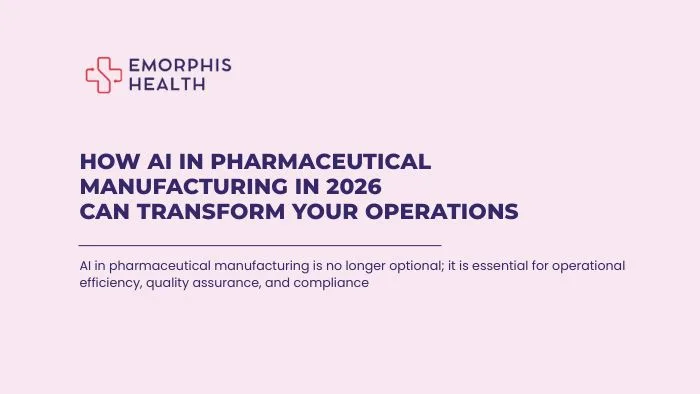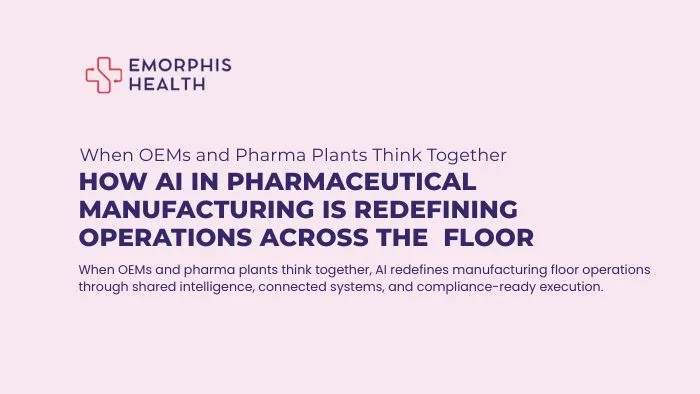The Benefits of AI in Healthcare
See Contents
- 1 The Benefits of AI in Healthcare
- 2 Well-Known Benefits of AI in Healthcare
- 3 Hidden or Lesser-Known Benefits of AI in Healthcare
- 4 How AI Helps Doctors Make Smarter Decisions
- 5 Future Trends in AI Healthcare Benefits
- 6 Challenges and Ethical Considerations in AI Healthcare
- 7 Conclusion: The Expanding Benefits of AI in Healthcare
Artificial Intelligence (AI) is changing the healthcare industry in ways that were once considered impossible. Hospitals, clinics, and telemedicine platforms are using AI to make medical processes faster, more precise, and more patient-focused. Understanding the benefits of AI in healthcare helps providers improve care, reduce errors, and enhance overall operational efficiency. While some benefits are widely recognized, there are several hidden advantages that are only beginning to be explored. The future promises even greater advancements that could transform healthcare delivery entirely.
Well-Known Benefits of AI in Healthcare
Many healthcare professionals and patients are already aware of the common advantages of AI. These benefits are often cited as the primary reasons for AI adoption in hospitals, clinics, and digital health platforms.
Faster and More Accurate Diagnosis
AI tools can analyze medical images, lab results, and patient records faster than traditional methods. For instance, AI-powered imaging systems can identify early signs of cancer, heart disease, or neurological disorders with a level of accuracy that rivals experienced radiologists. This allows doctors to begin treatment earlier and improve patient outcomes.
Personalized Treatment Plans
AI systems process large volumes of data, including patient medical history, genetics, and lifestyle information, to create tailored treatment strategies. Personalized plans increase the effectiveness of therapies and reduce the trial-and-error approach that can delay recovery.
Predictive Care for Chronic Diseases
AI can anticipate health risks by analyzing patterns in patient data. For example, predictive models can identify individuals at risk for diabetes or heart disease, allowing doctors to implement preventive measures and reduce complications.
Efficiency in Hospital Operations
Hospitals benefit from AI by automating routine administrative tasks such as appointment scheduling, billing, and patient record management. This reduces the workload on staff, allowing them to focus on direct patient care while minimizing human error.
Support for Telemedicine and Virtual Consultations
AI enhances telehealth platforms by providing symptom checkers, virtual assistants, and automated triage systems. Patients receive faster guidance and support, making healthcare more accessible, especially in areas with limited medical facilities.
While these benefits are commonly known, AI provides several advantages that are often overlooked. Exploring these hidden benefits shows the full potential of AI in healthcare and how it is reshaping patient care and hospital management.


Beyond the commonly discussed advantages, AI offers numerous hidden benefits that are increasingly shaping modern healthcare. These benefits improve patient outcomes, streamline operations, and strengthen the overall healthcare ecosystem.
Remote Patient Monitoring and Continuous Health Tracking
AI-powered wearable devices and connected health systems allow healthcare providers to track patients in real time. For example, smartwatches and sensors can monitor heart rate, blood pressure, glucose levels, and sleep patterns. AI algorithms analyze this data to detect anomalies and predict potential complications before they become serious. Remote monitoring also reduces unnecessary hospital visits, lowers healthcare costs, and empowers patients to take a more active role in managing their health.
Fraud Detection and Data Security
Healthcare fraud is a major concern, with billions lost annually due to false claims or billing errors. AI can analyze large volumes of claims and transaction data to identify unusual patterns and flag suspicious activity. Additionally, AI enhances data security by detecting cyber threats and protecting sensitive patient information from breaches. This combination of fraud detection and cybersecurity ensures the integrity of healthcare systems and builds trust among patients.
AI-Powered Patient Engagement
Patient engagement is critical for treatment adherence and improved outcomes. AI chatbots and virtual assistants provide timely reminders for medication, appointments, and lifestyle management. They also answer common health questions, triage minor symptoms, and guide patients to appropriate care channels. By providing 24/7 support, AI reduces the burden on medical staff and ensures patients remain informed and connected to their care plans.
Better Resource Management
Hospitals and clinics often struggle with limited resources, especially during peak periods. AI can forecast patient inflow, manage staffing schedules, and optimize bed and equipment usage. Predictive analytics allow administrators to anticipate demand, allocate resources efficiently, and minimize bottlenecks. This leads to smoother operations, reduced waiting times, and enhanced patient satisfaction.
Enhanced Medical Coding and Billing Accuracy
Manual coding is prone to human error, which can delay reimbursements and create compliance risks. AI automates coding and billing processes by analyzing medical records and identifying appropriate codes. This increases accuracy, reduces paperwork, and speeds up claims processing. Hospitals benefit from improved revenue cycles and fewer compliance issues.
Integration with Public Health Programs
AI’s ability to process large datasets makes it invaluable for public health initiatives. It can track disease outbreaks, predict epidemic patterns, and provide actionable insights for vaccination campaigns or preventive programs. Governments and organizations can use AI to monitor population health trends and allocate resources effectively, improving overall community health outcomes.
Real-Time Alerts for Emergency Situations
AI algorithms can detect sudden changes in a patient’s vital signs, such as heart rate spikes or oxygen drops, and immediately alert medical staff. These early warnings are crucial in intensive care units, emergency departments, and home monitoring systems, where timely intervention can save lives.
Improved Chronic Disease Management
AI supports long-term management of chronic diseases like diabetes, hypertension, and asthma. By analyzing trends in patient data, AI predicts flare-ups, suggests adjustments to treatment plans, and monitors patient adherence. This proactive approach reduces hospitalizations and improves the quality of life for patients.
Support for Clinical Trials and Research
AI accelerates medical research by analyzing large datasets, identifying suitable candidates for clinical trials, and predicting drug interactions. This not only shortens the research cycle but also increases the chances of successful outcomes, ultimately benefiting patients with faster access to innovative treatments.
These lesser-known benefits demonstrate AI’s potential beyond routine diagnostics and operational efficiency. By enhancing patient engagement, security, and chronic disease management, AI is empowering doctors and healthcare providers to make smarter, data-driven decisions, which we will explore next.


How AI Helps Doctors Make Smarter Decisions
AI is not meant to replace doctors; instead, it enhances their ability to make faster, more accurate, and informed medical decisions. By processing vast amounts of clinical data, AI assists physicians in ways that were previously impossible.
Clinical Decision Support Systems (CDSS)
AI-powered Clinical Decision Support Systems analyze patient data, medical history, lab results, and research studies to provide evidence-based recommendations. For instance, AI can suggest the most effective treatment plans based on patient-specific factors, helping doctors choose therapies that have the highest chance of success. These systems also reduce human error by alerting clinicians to potential drug interactions, allergies, or abnormal lab results.
Reducing Medical Errors
Medical errors remain a leading cause of preventable harm in healthcare. AI tools review medical records, detect inconsistencies, and flag anomalies that may be overlooked. For example, AI can identify subtle patterns in imaging scans that might indicate early-stage disease, ensuring timely diagnosis and reducing misdiagnosis.
AI-Assisted Surgery and Robotics
Robotic-assisted surgery powered by AI provides surgeons with precise control and real-time guidance. AI can map complex anatomy, predict complications, and even provide haptic feedback during procedures. This reduces surgical errors, shortens recovery times, and improves patient outcomes.
Risk Prediction and Patient Stratification
AI models can predict which patients are at higher risk for complications, hospital readmission, or disease progression. By stratifying patients according to risk levels, healthcare providers can prioritize care, allocate resources efficiently, and intervene proactively to prevent emergencies.
Streamlining Diagnostic Processes
AI helps doctors sift through vast amounts of patient data, including imaging, lab tests, and unstructured notes, to quickly identify relevant insights. This accelerates diagnosis, reduces unnecessary tests, and allows physicians to focus on complex decision-making rather than administrative tasks.
Supporting Multidisciplinary Care
In cases that require input from multiple specialists, AI consolidates patient information and provides a unified view. This ensures that every doctor involved in the care team has access to the same data and recommendations, improving coordination and reducing treatment delays.
While AI already strengthens clinical decision-making, its influence is expanding into predictive and preventive care. The next section explores future trends that could redefine the benefits of AI in healthcare entirely.


Future Trends in AI Healthcare Benefits
The healthcare landscape is evolving rapidly, and AI is at the forefront of this transformation. Beyond what is currently well-known, emerging trends promise to expand the benefits of AI in healthcare and redefine patient care, medical research, and hospital management.
AI in Drug Discovery and Precision Medicine
AI is revolutionizing drug discovery by analyzing molecular structures, predicting drug interactions, and identifying promising candidates faster than traditional methods. Precision medicine benefits from AI by enabling treatments tailored to an individual’s genetic profile, lifestyle, and health history. This reduces trial-and-error approaches, shortens development timelines, and increases the success rate of therapies.
Predictive and Preventive Healthcare Models
AI’s ability to process large datasets allows for predictive models that anticipate health risks before they become serious. For example, AI can forecast the likelihood of heart attacks, diabetes complications, or hospital readmissions. Preventive strategies based on these predictions not only improve patient outcomes but also reduce healthcare costs by avoiding emergency interventions.
Real-Time Personalized Care with IoT and Wearable Devices
The Internet of Medical Things (IoMT) combined with AI enables continuous monitoring of patients through smart devices. AI algorithms analyze real-time data from wearables, sensors, and home monitoring equipment to provide personalized health recommendations. This approach enhances patient engagement, allows early intervention, and empowers patients to take proactive control of their health.
AI Integration with Genomics and Advanced Diagnostics
Genomic medicine is becoming more accessible thanks to AI. AI analyzes complex genomic data to identify disease markers, predict susceptibility, and guide personalized treatments. Coupled with advanced diagnostic tools, AI enables earlier and more accurate detection of conditions such as cancer, rare genetic disorders, and neurodegenerative diseases.
AI for Population Health Management
AI helps healthcare organizations track population health trends, detect outbreaks, and plan interventions at scale. Predictive analytics identify high-risk groups, enabling targeted preventive programs and better allocation of public health resources. This trend will become increasingly important in managing global health challenges and improving community well-being.
Integration with Virtual Reality and Augmented Reality in Training
AI combined with VR and AR is transforming medical education and surgical training. These technologies simulate complex procedures and patient scenarios, providing healthcare professionals with immersive, hands-on learning experiences. This reduces training risks, improves skills, and prepares clinicians for real-world challenges.
As AI continues to advance, these future trends will unlock unprecedented possibilities in healthcare. However, realizing these benefits requires careful consideration of challenges and ethical responsibilities, which we will discuss next.


Challenges and Ethical Considerations in AI Healthcare
While AI offers remarkable benefits in healthcare, implementing these technologies is not without challenges. Addressing these issues is essential to ensure AI enhances patient care safely and effectively.
Data Privacy and Security Concerns
AI relies on large amounts of patient data to deliver accurate insights. Protecting sensitive health information is crucial, as breaches can compromise patient trust and violate regulations like HIPAA. Healthcare organizations must implement strong cybersecurity measures, encryption, and strict access controls to safeguard data while still enabling AI-driven analysis.
Bias in AI Algorithms
AI systems learn from existing data, and if the data contains biases, the AI may replicate or even amplify these disparities. For example, diagnostic tools trained predominantly on one demographic may perform poorly for other populations. Continuous monitoring, diverse datasets, and regular algorithm evaluation are necessary to ensure fairness and accuracy in AI healthcare applications.
Workforce Adaptation and Training
Integrating AI into healthcare changes workflows and requires new skills for doctors, nurses, and administrative staff. Training programs and support systems are essential to help healthcare professionals leverage AI effectively without disrupting patient care. Resistance to change or lack of understanding can hinder the successful adoption of AI tools.
Regulatory and Legal Challenges
AI applications in healthcare must comply with medical regulations and standards. Ensuring transparency, accountability, and validation of AI-driven recommendations is critical. Regulatory bodies are continuously evolving guidelines, and healthcare organizations need to stay updated to maintain compliance while deploying AI solutions.
Ethical Implications in Decision-Making
AI can assist in clinical decisions, but responsibility for outcomes still lies with human professionals. Ethical concerns include over-reliance on AI, informed consent, and ensuring that AI recommendations do not override clinical judgment. Balancing technology and human expertise is vital for ethical healthcare delivery.
Cost and Infrastructure Limitations
Implementing AI requires significant investment in technology, infrastructure, and training. Smaller clinics or hospitals with limited budgets may face challenges adopting advanced AI solutions, potentially creating disparities in access to AI-driven care.
Despite these challenges, the advantages of AI continue to grow, making it essential for healthcare organizations to adopt AI thoughtfully. By addressing ethical, technical, and regulatory concerns, the full benefits of AI in healthcare can be realized safely and effectively.
Conclusion: The Expanding Benefits of AI in Healthcare
AI is transforming healthcare in once unimaginable ways. From improving diagnostic accuracy and personalizing treatment plans to enabling remote monitoring, fraud detection, and better resource management, the benefits of AI in healthcare are already evident. Lesser-known advantages, such as AI-powered patient engagement, real-time alerts, and integration with public health programs, further highlight its potential to enhance patient outcomes and operational efficiency.
Looking ahead, future trends like predictive and preventive healthcare, AI-driven drug discovery, genomics integration, and IoT-enabled personalized care promise to take healthcare to new heights. While challenges such as data privacy, algorithmic bias, workforce adaptation, and regulatory compliance remain, addressing them thoughtfully will ensure AI’s safe and effective adoption.
In summary, the benefits of AI in healthcare extend beyond what most people realize. For healthcare providers, patients, and policymakers, embracing AI technologies offers the opportunity to improve the quality of care, reduce costs, and prepare for a future where data-driven insights guide every medical decision. To explore how AI can be implemented in your organization, connect with Emorphis AI software development services experts for more details and guidance on building innovative healthcare solutions.
Further, find details on Healthcare 5.0: The Human-Centric Future of Digital Health.

